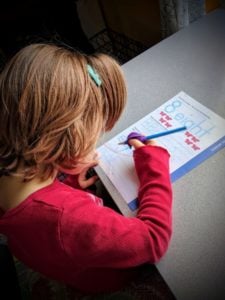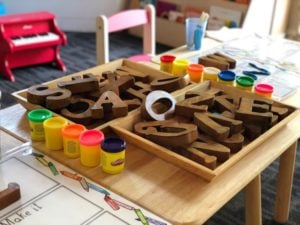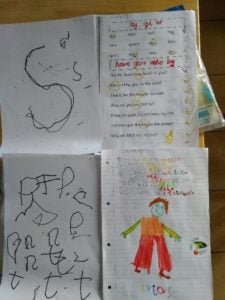Written by Longina, a tutor working through SENsational Tutors Ltd.
How to encourage your child with SEN to write

For many children, not only those with SEN, learning to write can be quite a big challenge. This is because writing with a pen or pencil involves combining various skills and abilities, including coordination, muscle strength, organisation and language. Read Longina’s top-tips to help your child with SEN improve their writing skills:

4 tips to help your child with SEN to improve their writing skills
To help you face and overcome these common challenges, we’ve put together some tried and tested tips you can try at home to help your child with SEN to begin developing their writing skills.
TIP 1: Get creative and make your child smile

Collect some simple shapes and coloured whiteboard pens. Spread these out on your writing table.
Encourage your child to begin tracing shapes or simple pictures with a pen or pencil to help him or her get used to getting a good grip and to find the right level of muscle control.
Start off with shapes that are easy to trace so your child can feel a sense of achievement. It’s also a good idea to add letters to any pictures so your child can get used to seeing and recognising their shapes and can feel comfortable tracing these too. Write these letters using wide-tipped pens so your child can easily trace over the lines.
Encourage your child to try one paper at the time. If your child is happy with this activity and enjoys tracing, you can suggest they try another shape or letter but limit this activity to two tracings, to avoid your child losing interest or focus.
TIP 2: Use the power of art!

Art can really help children to build their confidence in using handwriting materials, such as crayons, felt pens, pencils and paintbrushes. Invest in different sizes and colours of paints and a variety of paper and let your child’s imagination take hold!
Once they’ve drawn an image, encourage them to write letters or even words to their picture.
TIP 3: Remember to harness our natural senses

Research suggests that multi-sensory techniques stimulate the brain and have a powerful impact on learning and development. Try to be creative and perhaps use a variety of textures of paper or different coloured metallic pens. How about selecting from a range of music to listen to whilst you have fun, or even spraying different calming or energising scents to enlighten their senses?
Some children get overstimulated by their environment so it’s a good idea to limit the time of the activities. Remember that you can take a short break before carrying on too, to help keep your child engaged and interested!
Try to finish each activity you’ve given to your child to do, because these small milestones will become important in building up and growing your child’s experience and confidence.
TIP 4: Be flexible – and keep it fun!

Always keep in mind that writing should be something fun for your child! When you want to start a writing activity, think about the current mood your child may be in. If he or she is in a good mood, it’s more likely that writing will be something to enjoy, rather than something you fight against!
This might mean that you’ll need to think on your feet and perhaps introduce a different activity that will engage your child first before switching to a writing teaching session. Keep your plans flexible and adapt your lessons to suit your child.
Every child is different and unique. Don’t risk pushing a writing session if your child is really unwilling or disengaged because you may end up risking all your hard work only to create more resistance.
A note about maintaining a positive ending: at the end of every writing session with your child, ask him or her to sit in a suitable position for writing, to hold the pencil or pen comfortably and correctly and form letters in the right direction. This positive sign-off for each lesson will help to reinforce that lesson’s focus and give your child a sense of achievement.
Longina, the author of this blog, is a Qualified Primary Teacher with QTS, has a Masters’ Degree in Education/ Pedagogy, a Postgraduate Diploma in Specific Language Difficulties and Montessori Teaching experience.
Need a little extra help from a specialist SEN tutor?
Book a session now!
SENsational Tutors Ltd!
At SENsational Tutors Ltd, we aim to inspire a love of learning through fun and exciting activities. We offer tailor-made support packages during the school holidays and on regular, weekly basis. Sessions can be combined with additional behaviour or communication support, if necessary.
Register here to receive information about our services, including our FREE webinars!
Contact us here







